
 |
|
| |||||||||||||||||
| May The Force Be With You - Star Wars Trilogy DVD Media Day
Star Wars Media Day – Sept. 8, 2004 Could
there be a bigger event on DVD than the release of the long-awaited
Star Wars Trilogy? Probably not – and so with that in
mind, I was delighted to be able to attend the Star Wars Media
Day hosted by Lucasfilm and Twentieth Century Fox. Held in the small
but stylish Silent Movie Theater in West Hollywood, the Star Wars
Media Day attracted what felt like a fairly select group: there were
probably around 50-60 journalists in attendance, from both print and
online media. Dazzling new transfers The first event of the day was a demonstration of the remastered DVD, led by Jim Ward, Lucasfilm's director of marketing and distribution. In groups of about ten or so, we were seated in a small, cozy viewing room set up with a state-of-the-art surround sound system and a large widescreen plasma TV. The intent was undoubtedly to show how well the Star Wars DVDs played in the "home theater" environment (as opposed to showing off the transfers on the large auditorium screen), and it certainly worked. Fortunately, my own home setup is sufficiently nice that I wasn't rendered insanely jealous by the demo system (although I admit it was very impressive to hear the bass cranked up so much that the little knick-knacks on the coffee table were actually rattling around during the battle scenes... my neighbors wouldn't quite appreciate that.) 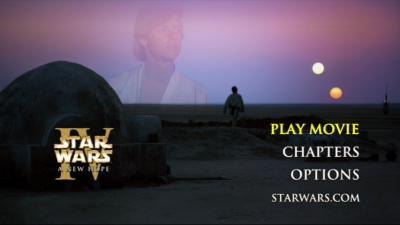
Ward demoed one key scene from each film, choosing ones that were particularly challenging in terms of image quality. From Episode IV, the opening sequence with R2D2 and C3P0 in the midst of the shootout between the rebels and the Stormtroopers showed off the amazing level of detail in the shots; from Episode V, the fight against the Imperial Walkers on Hoth displayed how clean the image looked even with the unforgiving background of snow; and from Episode VI, a desert scene demonstrated once again the overall clean appearance of the transfer in both long-distance and close-up shots. One word suffices for all three samples: dazzling. After that wrapped up, we all reassembled in the main auditorium for the rest of the presentations. A guided tour of the bonus content The first
item on the agenda here was the fourth "bonus disc"
included in the set, with Jim Ward taking us through a guided tour to
show off the special features. The menus seemed to be a particular
point of pride, oddly enough; I'm of the "make 'em functional
and move on" point of view, but clearly George Lucas felt that
the menus were the first step in making the viewer feel immersed in
the film. The next topic of discussion about the bonus content was the "trailers and TV spots" section. Ward assured us that while this kind of material is usually an afterthought on a DVD release, in this instance it would really please die-hard fans, as it collects every single trailer or teaser ever released for any of the films, both original and special edition versions. Along the same lines of "making the completionists happy," the production photos also include shots that are said to be "never before seen." Some time was spent demonstrating the new Star Wars Battlefront game as well (for the PS2, XBox, and PC), as it's set to be released on the same day as the Star Wars DVD trilogy, and there's a playable level included in the bonus content of the DVD. Ward also outlined the content for the featurettes and documentary, again emphasizing that the content was fresh and new, and would be of interest to even the most dedicated fans who think they know everything about the franchise. I was particularly pleased to hear that the director of the two-and-a-half-hour documentary on the making of the films was Kevin Burns, the man responsible for the making-of documentary for Cleopatra, which I consider to be one of the best of its kind. Straight from the horse's mouth While it was very nice to see the bonus material demonstrated, the real heart of the day's material came from the panelists who fielded questions from the audience. First off, we got a three-person panel consisting of Rick Dean (the THX technical director), John Lowry (the head film restoration expert), and Van Ling (the DVD producer and menu designer). Jim Ward also contributed some insights. The hottest issue of the day revolved around the ever-controversial "special edition vs. original edition" topic, as the first question to come from the audience had to do with how Lucas could justify releasing an altered version of Star Wars when he'd publicly excoriated the colorization of the original black-and-white Three Stooges films. Jim Ward took up the reply here, pointing out that Lucas felt very strongly in the artist's right to choose the presentation of his own material, and that while the Stooges weren't around to give the OK to colorization, Lucas himself, as the artist, had every right to decide which version of the Star Wars films to release. After several other pointed questions from the audience on the topic of the special editions (clearly everyone in the audience would have preferred the originals), Ward simply stressed that George Lucas had made it very clear that the special editions of the films represent most closely what he really wanted to do with the films, and wasn't able to do on the first pass due to budgetary and technical limitations. One interesting question raised by an audience member touched on the absence of deleted scenes from the bonus material. Ward commented that with so much material from the Star Wars archives, they simply had to pick and choose what to fit on the disc. He then went on to imply that at least some material from the archives was being saved for later releases of the set on later formats like HD-DVD. In my mind, the most interesting panelist was film restoration expert John Lowry, who explained that even though the films had theoretically been restored for the 1997 special editions, the prints were in terrible condition, and that it was the most exhaustive (and, I think, exhausting) restoration process that his team had ever attempted. He touched on specific technical issues such as matching up the image quality of special effects shots with the live-action shots (since the former, due to the nature of the effect creation process, were always in worse condition than the latter), and even commented that it's possible to restore "too much" (for instance, if the restored transfer starts to reveal detail like makeup lines that the director never intended to be seen) and that part of the process is knowing when to stop. It was amusingly clear that Lowry is a total perfectionist, as he mentioned that his team had only 30 days to spend on each film, and he would have wanted to spend even more time restoring them. He dryly commented that "We don't usually have to deal with a living director," and added that doing so was "a pain in the ass." But he went on to add that being able to work with Lucas meant that he could find out how far to go with the restoration: for instance, in some scenes he had to touch up the film itself to correct flaws that were revealed once all the dirt and grime had been removed from the transfer, and slight grain had to be added to the newer "special edition" scenes to make them visually compatible with the rest of the film. After the panel of technical experts had finished, the next person on stage was Kevin Burns, the producer and director of the documentary. He emphasized that he'd been given free rein to do a complete, "warts and all" portrayal of the making of the three films, and that he had access not only to the complete Star Wars archive, but also to information about what went on between the filming of the three movies. More than 40 different people ended up contributing their thoughts and recollections to the documentary, and Burns observed that they were able to get every single person they wanted to... albeit not without some effort. Apparently some people were extremely reluctant to discuss Star Wars, most notably Anthony Daniels, who only agreed to the interview when Burns promised not to ask him "what it was like to be C-3P0." Next up was Irvin Kershner, the director of The Empire Strikes Back, with some interesting comments about his role in making the second Star Wars film. The first question had to do with his opinion on the changes made for the special edition (yes, this crowd definitely favored the originals!), to which Kershner replied that he really didn't feel that the film was changed at all: there was just the added snow monster, the new window views in the city, and enhanced color and sound. From his point of view, it was clearly perfectly fine and nothing to even consider as significant. 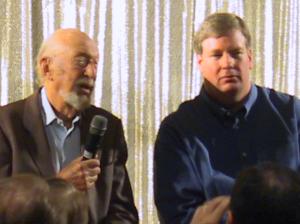 When asked about why he felt The Empire Strikes Back was the favorite of many viewers, Kershner explained that he felt his focus on characterization and the balance of darkness and humor were what made the film so successful. He commented that before doing Star Wars, he had "absolutely no" experience with a special-effects-heavy film, and that he didn't even like science fiction. He actually viewed Star Wars as "a fable, a fairy tale" and was inspired in his approach by the work of Joseph Campbell and Carl Jung, among others. Considering the success of his approach, which aimed for a film suitable for children but with additional levels of meaning for adults, a natural question that arose was why he didn't helm the third film; Kershner pointed out that he'd already spent three years of his life on creating The Empire Strikes Back: it was natural that he didn't really want to tackle the third one. As to what were some of the greatest challenges of filming The Empire Strikes Back, Kershner brought up the difficulty of filming scenes with Yoda: at that point it was completely new territory to work with a puppet character who was intended to represent a living being. One anecdote that he gave was that the Yoda puppet set-up required a two-level stage, with Frank Oz below and Mark Hamill above... with the problem being that they couldn't hear each others' lines! In the end, after a great deal of rehearsing, Hamill gave his performance entirely without cues from Oz, leaving in just the right length of pause for Yoda's lines to fit in. On the topic of Yoda, Kershner dryly commented that Yoda's philosophy, while appealing, is really very simple. "Young people think it's profound. I wish they would read more. They'd see it wasn't profound." The "star power" was reserved for the end, as Mark Hamill was the final guest to come up for a question-and-answer session. Hamill came across as an extremely pleasant, personable, cheerful, and animated guy, with a very keen sense of humor... even (or perhaps especially) regarding his own role in Star Wars. The first question was which Star Wars parody was his favorite; Hamill replied that he had always found the comments in Clerks to be particularly funny. Hamill spoke at some length about his experiences as part of the Star Wars "phenomenon"; while he had felt from the very beginning when he read the script that the film would be something special, he was astonished by how much it came to permeate popular culture. Overall, he seemed very positive about the whole experience, and certainly seemed to have come to terms with its massive effect on his career. He mentioned his current project (as producer of a puppet/animation program) in very positive terms, and emphasized that he focused on his career in the present day, and was not always looking back at Star Wars. Amusingly, he added "I flunked the Star Wars trivia contest," commenting that many of the fiddly details (like the names of the robots) that fans are interested in were things that were invented after the movies were completed. One interesting comment that Hamill made was that Lucas actually approached him about his participation in the other trilogies, and whether he would be interested in doing #9. Hamill said sure, he would... but considering that this conversation took place in 1976, the thought of Star Wars Episode IX was so far in the future that he never thought it would happen! He also commented that at first, when the cast thought that Episodes I-III would be filmed relatively soon after IV-VI, he had thought it would be weird to see the new cast filming in the Star Wars universe... like seeing someone rifling through your personal belongings. But so much time passed before the new films were done, Hamill continued, that in the end it didn't seem strange at all to see the new cast of Star Wars. 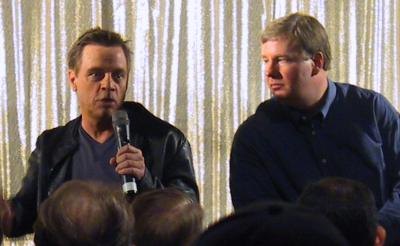 Hamill rounded off his Q&A session with some funny anecdotes about the filming process, for instance recalling how all the actors were constantly trying to make the ultra-serious George Lucas laugh on the set. His talents as a voice actor certainly came to the fore in several wickedly funny imitations, such as that of the British crew for the first film who thought that Star Wars was a "low-rent Doctor Who." And that was that! The Fox publicity folks had prepared press kits and nifty bags of Star Wars-themed swag for each journalist (with weird things like about 10 different Star Wars Pez dispensers)... but most importantly, at the bottom of each bag was what we were all eager to get our hands on: actual copies of the Star Wars Trilogy on DVD. After seeing all the presentations and previews, I can't wait to check it out! (And you won't have to wait long, either: the review will be up as soon as humanly possible!) Of course, the day's events wouldn't have been complete without some sight-seeing around Hollywood Boulevard, including a few glimpses of how the Star Wars cast (both human and robotic) have been immortalized as part of the very essence of movie stardom... 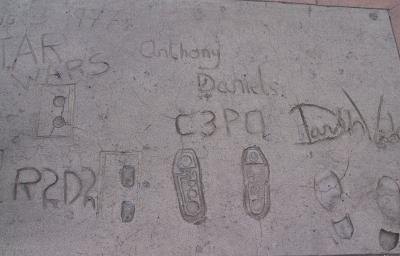
Read Holly's Review of The Star Wars Trilogy DVD --Holly E. Ordway 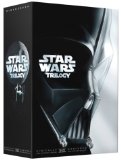
Columns
|
| |||||||||||||||
| |||||||||||||||||